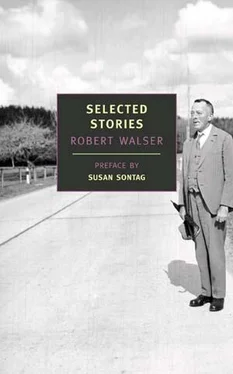[1917]
ONE who could not trust his eyes looked at the door of a room to see if it was closed. Indeed it was closed, and properly to be sure, there was no reason to doubt it. The door was definitely closed, but he who did not trust his eyes did not believe it, sniffed about the door with his nose, so that he could smell if it was closed or not. It was really and truly closed. Without question it was closed. It was by no means open. By all means it was closed. Undoubtedly the door was closed. Doubt was in no way to be feared; he who did not trust his eyes, however, doubted strongly that the door was actually closed, although he clearly saw how tightly it was shut. It was as tightly shut as those doors which cannot on the whole be shut any tighter, but he who did not trust his eyes was still a long way from being convinced of that. He stared hard at the door and asked it if it was closed. “Door, tell me, are you closed?” he asked, but the door gave no answer. It was, anyway, not at all necessary that it answered, since it was closed. The door was perfectly in order, but he who did not trust his eyes did not trust the door, did not believe that it was in order, continued to doubt that it was in order. “Are you really shut or are you not shut?” he asked again, but of course the door anew gave no answer. Can one demand of a door that it give an answer? Again the door was looked at suspiciously to find out if it was truly closed. At last he comprehended that it was closed, at last he was convinced of it. Thereupon he laughed loudly, was very happy that he could laugh, and said to the door: “So! I’ve got you,” and with this fine expression he was satisfied and went to his daily work. Is not such a person a fool? Certainly! but he was just one who doubted everything.
Once he wrote a letter. After he had it quite ready, i.e., had completely finished it, he looked askance at the letter, for once again he did not trust his eyes and was not close to believing he had written a letter. The letter had, however, certainly been written, there was no doubt about it, but, as with the door, he who did not trust his eyes sniffed about the letter with his nose, was the height of suspicion and wondered if the letter was really written now or not. Without doubt it was written, it was definitely written, but he who did not trust his eyes was in no way convinced of it, rather he smelled, as I said, cautiously and carefully around the letter and asked in a loud cry: “Letter, tell me, are you written or not?” The letter naturally did not give the slightest answer. Since when can letters give speeches and answers? The letter was perfectly in order, quite ready, readable, and nicely written word by word, sentence by sentence. Splendid and proper stood the letters, periods, commas, semicolons, question marks, and exclamation points, and the delicate quotation marks all in place. Not a dot on an i was missing in the great work; he, however, who had written the masterpiece of a letter and unfortunately did not trust his eyes, was in no way convinced of all that, rather asked anew: “Are you in order, letter?” It gave, however, no answer again, naturally. For that it was again looked askance at and considered obliquely. At last the dumb person knew he had really and truly written the letter, and for that reason laughed joyfully and loudly, was happy like a small child, rubbed his hands full of pleasure, folded the letter together, stuck it exultantly in a suitable envelope, and said: “So! I’ve got you,” about which fine expression he was uncommonly delighted. Thereupon he went to his daily work. Is not such a person a fool? Indeed, but he was just one who believed in nothing, one who did not come out from sorrows, distress, and doubt, one who, as I said, doubted everything.
One other time, he wanted to drink a glass of red wine which was before him, but he wouldn’t dare do it, because again he did not trust his eyes. No doubt there was the glass of wine. Without doubt, the glass of wine stood there in every respect, and the question, if it stood there or did not stand there, was thoroughly absurd and silly. Any average person would have immediately comprehended the glass of wine, but he who did not trust his eyes did not comprehend it, did not believe it, looked at the glass of wine for a good half hour, sniffed about it with his fool nose a meter long, as with the letter, and asked: “Glass of wine, tell me, are you really there or are you really not there?” The question was superfluous, since the glass of wine was there, that was fact. It gave no answer, naturally, to the dumb question. A glass of wine gives no answer, it is simply there and wants to be drunk, which is better than all talking and answering. Our good glass of wine was suspiciously sniffed at with the nose from all sides, like the letter before, and stared at with the eyes, like the door before. “Are you at bottom there, or aren’t you there?” was asked again, and again no answer was forthcoming. “So drink it then, so taste it, let yourself enjoy it, then you will have felt and experienced it, and its existence will no longer be in doubt to you,” one would have liked to shout at him, him who did not trust his eyes, who looked at the glass of wine mistrustfully, instead of putting it to his lips. He was still a long way from being convinced. He went into still more delicate and lengthy details; at last, however, he seemed to have comprehended it, finally he believed that there was in fact a glass of wine under his nose. “So! I’ve got you,” he said, laughed loudly like a child, rubbed his hands again in pleasure, smacked his tongue, gave himself a sound slap on the head out of purely foolish and immense joy, took the glass of wine carefully into his hands and drank it up, was satisfied at that, and thereupon went to his daily work. Is not such a person an arrant fool? Surely, but he was just one who did not trust his ears or eyes, one who did not have a single calm minute due to sincerely sensitive and overly sensitive deliberation, one who was unhappy whenever the least thing failed to pass or work exactly, a fool for order and punctuality, a fool for accuracy and precision, one who should have been sent and driven into a School of Thoughtlessness, one who, in God’s name, as I said, doubted everything.
[1917]
Translated by Tom Whalen and Carol Gehrig
A WOMAN who was only just a little flighty went to town to buy something good for supper for herself and her husband. Of course, many a woman has gone shopping and in so doing been just a little absentminded. So in no way is this story new; all the same, I shall continue and relate that the woman who had wanted to buy something good for supper for herself and her husband and for this reason had gone to town did not exactly have her mind on the matter. Over and over she considered what delights and delicacies she could buy for herself and her husband, but since she didn’t, as already mentioned, exactly have her mind on the matter and was a little absentminded, she came to no decision, and it seemed that she did not exactly know what she really wanted. “It must be something that can be made quickly since it’s already late, my time is limited,” she thought. God! She was, you know, only just a little flighty and did not exactly have her mind on the matter. Impartiality and objectivity are fine and good. But the woman here was not particularly objective, rather a little absentminded and flighty. Over and over she considered but came, as already mentioned, to no decision. The ability to make a decision is fine and good. But this woman possessed no such ability. She wanted to buy something really good and delicious for herself and her husband to eat. And for this fine reason she went to town; but she simply did not succeed, she simply did not succeed. Over and over she considered. She wasn’t lacking in good will, she certainly wasn’t lacking in good intentions, she was just a little flighty, didn’t have her mind on the matter, and therefore didn’t succeed. It isn’t good when minds aren’t on the matter, and, in a word, the woman finally got disgusted, and she went home with nothing at all.
Читать дальше












